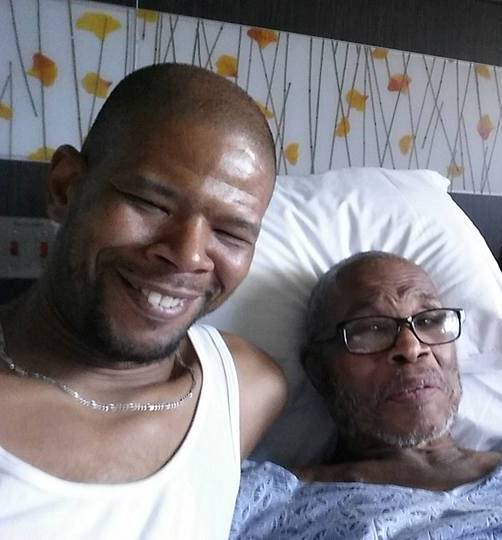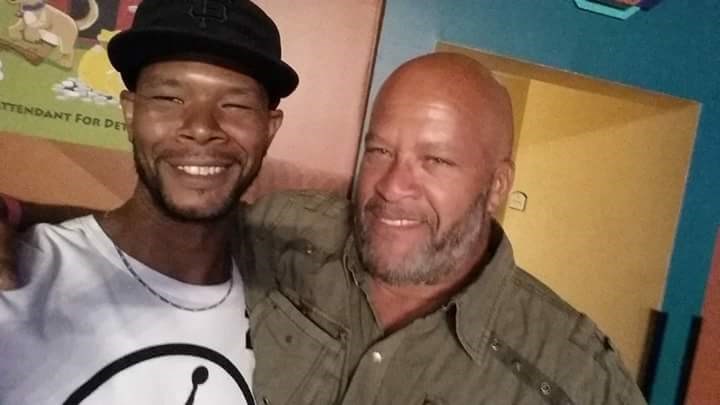By Ko’Fawn Jones, as told to Lucy Salcido Carter
Luther Jones was wrongfully convicted in Lake County, CA, and spent 20 years in prison before he was exonerated and released in February 2016, gravely ill from health issues he developed while in prison. His son, Ko’Fawn, describes this tragedy from his perspective.
In 1996 when I was in the National Guard, my father called me and told me that Clear Lake, California had him on its most-wanted list, with his picture on the front page of the local newspaper. My father said he was going to go up to Clear Lake to see what was going on. When he went up there, he was arrested and never got out until this year. I didn’t see my father for 20 years.

Ko’Fawn Jones visits his father, Luther, in the hospital. Photo courtesy of Ko’Fawn Jones via Facebook
All my life, I’ve stayed in touch with my dad. Even when he was wrongfully incarcerated, I stayed in touch with him. I got in trouble as an adolescent, so I wasn’t able to visit my father in prison. So we wrote letters, and I always knew which prison he was in; he was in 10 different ones.
Over the 20 years he was in prison, I kept trying to find a pro bono lawyer who would take over my father’s case. No one would help.
One day I was in Fort Bragg for my sons’ Pop Warner football game. Before the game, we went into Walgreens, and a lady came down the aisle and started talking to me. It was the alleged victim in my father’s case. I hadn’t seen her since she was nine or 10 years old. We hugged because all those years ago we had been like stepsiblings. We exchanged phone numbers and became Facebook friends, and over six years we stayed in contact with each other.
I lost contact with her for two years, and thought I’d lost my chance to get her to do the right thing. But magically she surfaced again and said she had gotten involved with drugs. Part of her rehab was to make right the things she had done wrong in the past. One of those things was what she had done to my father by wrongfully accusing him.
On February 4, 2016, she called me and said, “I’m ready to do this. What do I do?” I told her to call the district attorney. She did. That next Monday morning, I was reading the newspaper and saw an article saying that my father was going to be released.
My father didn’t actually get released until Wednesday. When I got down to the Stockton facility, they put my father’s belongings in the back of my truck and told me my father was coming by ambulance from the county hospital. I had no idea he was that sick.
They told my father only a half-hour before his release that he was getting out. He didn’t believe it. He thought it was a joke. I got a call while I was waiting for my father; they put him on the phone. I hadn’t talked to my dad in four or five years. He said, “Hello,” and I said, “I told you I was going to get you out of there.” He said, “You did, you did, you did.”
They brought my dad in the ambulance to my house. It was a chilling sight to see my dad so small and helpless. My dad had never been a helpless person; but there he was on the gurney in the back of the ambulance crying. They put him in my bed. He and I ate egg sandwiches and stayed up watching movies until late.
The next morning I couldn’t wake my father up, so I called the Stockton facility. They told me to call 911, so I did. I’ve since tried to get my father’s medical records from that place, but I’ve never gotten anything from them.
When I called 911, they came, performed emergency procedures and then took my dad to the hospital. That’s when I learned about his condition. The hospital had to start from ground zero with him because I had gotten no information from the prison. The prison hadn’t told me what he had, what the medicine was for, or how often to give it to him.

From left: Ko’Fawn Jones with NCIP advisory board member Rick Walker. Photo provided by Rick Walker
My father has been in and out of the hospital so many times since February I’ve lost count. It feels like I just got him back, and now I’m losing him again. While he was in and out of hospitals, I was talking to doctors, social workers, NCIP, other lawyers, and exonerees to learn how to help my father. I set up my house for him as best I could.
I was taking a lot in emotionally, but I didn’t have any way to release anything. NCIP advisory board member Rick Walker and Policy Director Lucy Salcido Carter told me about NCIP’s June restorative justice retreat. I went. The retreat was where I got the release. It was amazing for me to hear stories from other exonerees. I didn’t go through what they went through, but I’m also a victim of a wrongful conviction. Everyone at the retreat had been through something; everyone there was wonderful.
Now I’m waiting for my father’s state compensation to come through so I can get really good health care for him. I’m not a doctor, but I know he’s not going to be with us long. I want 24-hour care for him. He wants a house big enough for his children to stay with him when they visit. Compensation will let my dad have his kids around while he’s still here. I’m looking forward to the time I have left with my dad – we have a lot of catching up to do.
Update: Luther Jones’ state compensation was recently approved through the passage of SB 1186. NCIP drafted his compensation claim with clinic students and drafted the petition for factual innocence, then helped expedite the passage of SB 1186. Ko’Fawn will soon be able to secure the health care his father so desperately needs.
Send a message of support to Luther Jones and his family here.
Read more about the exoneree compensation process here.